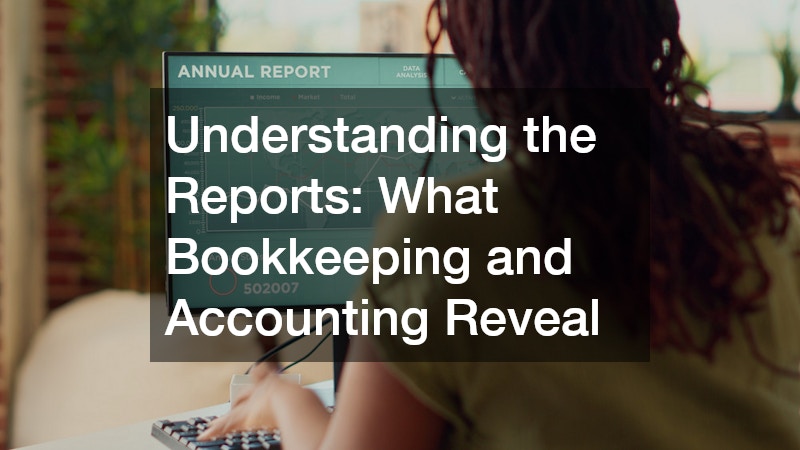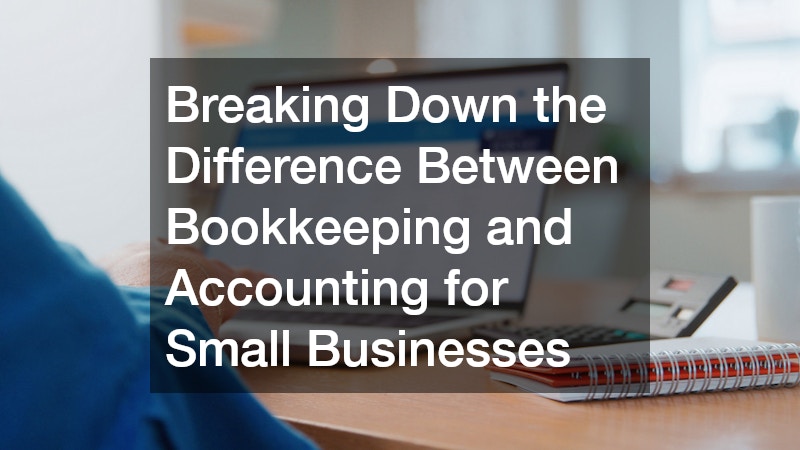For small business owners, financial clarity is key to survival and growth. Yet, many entrepreneurs lump bookkeeping and accounting into the same category, treating them as interchangeable functions. In truth, while the two roles overlap in some areas, they serve distinct and equally critical purposes in business operations. Bookkeeping ensures that every transaction is recorded accurately and timely manner, while accounting translates those records into meaningful financial insights.
If you’re a business owner unsure whether to hire a bookkeeper, an accountant, or both, this article is for you. We’ll walk you through the exact differences between bookkeeping and accounting, how they complement each other, and what each role brings to your business’s financial health. By the end, you’ll know what kind of financial help you need—and when.
What Is Bookkeeping?

Bookkeeping is the process of recording daily financial transactions in a consistent and organized way. Think of it as the foundation of your financial house—it captures everything from sales and purchases to receipts and payments. Bookkeepers are responsible for ensuring the accuracy and completeness of your financial records.
Key Functions of a Bookkeeper:
- Recording transactions in accounting software or ledgers
- Reconciling bank statements
- Issuing invoices and recording accounts receivable
- Managing accounts payable
- Tracking payroll data
- Categorizing expenses
- Producing basic financial reports (e.g., balance sheets)
Bookkeepers don’t typically provide strategic financial guidance. Instead, their role is operational—they maintain the financial data that accountants later analyze. For most small businesses, bookkeeping is a daily or weekly necessity that helps prevent errors and ensure compliance.
What is Accounting?
Accounting builds upon the foundational work done in bookkeeping. It focuses on organizing, interpreting, and analyzing financial records to produce meaningful reports. By using the information compiled by bookkeepers, accountants assess the financial health of a business and offer guidance that supports smarter financial planning and strategic decision-making.
Key Functions of an Accountant:
- Preparing adjusting journal entries
- Generating detailed financial statements
- Performing audits
- Handling tax preparation and planning
- Analyzing costs and revenues
- Advising on budgeting and financial strategy
- Ensuring regulatory compliance
In essence, accounting provides the big-picture perspective. While bookkeeping is about keeping score, accounting is about analyzing the game.
Bookkeeping vs. Accounting: What’s the Real Difference?
While both functions are essential to your business’s financial health, their goals, tasks, and required skills differ. Understanding these differences can help you hire the right professional at the right time.
Purpose and Focus
- Bookkeeping: Focuses on accurate recordkeeping and transaction management.
- Accounting: Focuses on financial analysis, tax strategy, and business planning.
Tools and Outputs
- Bookkeeping: Uses tools like QuickBooks, Xero, and spreadsheets to track income and expenses.
- Accounting: Uses those same tools to produce reports, interpret trends, and make forecasts.
Decision-Making Role
- Bookkeepers: Do not make financial decisions, but provide the data required for others to do so.
- Accountants: Help business owners make financial decisions based on the interpreted data.
Education and Credentials
- Bookkeepers: May not need a formal degree; some hold certifications like CPB (Certified Professional Bookkeeper).
- Accountants: Typically have a degree in accounting; many are CPAs (Certified Public Accountants).
Do You Need a Bookkeeper, an Accountant, or Both?
As a small business owner, the decision to hire a bookkeeper, an accountant, or both will depend on your business size, complexity, and growth stage.
You Might Need a Bookkeeper If:
- You’re dealing with frequent transactions (sales, expenses, invoices)
- You struggle to stay on top of daily financial tasks
- You want accurate records for tax season
- You need regular bank reconciliation
You Might Need an Accountant If:
- You’re making key financial decisions (expansion, equipment purchases)
- You need help interpreting your numbers
- You’re preparing for a tax audit
- You want to develop budgets or financial forecasts
You Likely Need Both If:
- Your business is growing rapidly
- You have multiple revenue streams
- You’re applying for loans or investors
- You want to scale sustainably and avoid financial blind spots
The Evolving Relationship: How Technology Is Changing Bookkeeping and Accounting
With the rise of cloud accounting and automation, the line between bookkeeping and accounting is blurring. Tools like QuickBooks Online, Xero, and Wave now automate many bookkeeping functions, reducing data entry and human error.
How Automation Impacts Each Role:
- Bookkeeping: Software now handles much of the categorization and bank feeds, allowing bookkeepers to focus more on data integrity.
- Accounting: Accountants can spend less time compiling data and more time interpreting it, delivering greater strategic value to business owners.
In this new ecosystem, bookkeepers are becoming tech-savvy administrators, while accountants are becoming high-level advisors. This evolution makes both roles even more essential to your business.
The Financial Risks of Neglecting Either Role
Choosing not to engage either a bookkeeper or an accountant can create serious issues for small businesses:
Common Consequences:
- Disorganized Books: Leads to inaccurate reporting and missed tax deductions.
- Late Tax Filings: Can result in penalties or audits.
- Cash Flow Mismanagement: Without reports, owners can overspend or miss warning signs.
- Inability to Secure Financing: Lenders require financial statements prepared by professionals.
Whether you manage the books yourself or outsource the work, overlooking either role can stifle growth and cause long-term financial harm.
Choosing the Right Professional: What to Look For
Hiring the right financial professional can make a huge difference in your company’s success. But how do you know if someone is qualified?
For Bookkeepers:
- Experience in your industry
- Proficiency in accounting software
- Strong organizational skills
- Attention to detail
For Accountants:
- CPA certification or accounting degree
- Knowledge of tax law and financial reporting
- Strategic thinking and analytical skills
- Good communication—someone who can explain complex topics simply
Ask for references, read reviews, and verify credentials before hiring anyone to manage your finances.
Bookkeeping and Accounting for Small Businesses: When to Outsource
Not every small business needs a full-time bookkeeper or accountant. Many successful companies start by outsourcing these functions and grow from there.
Benefits of Outsourcing:
- Cost savings (pay only for the services you need)
- Access to experts without hiring full-time staff
- Scalable solutions as your business grows
- More time to focus on core business tasks
Cloud-based firms and virtual financial professionals offer flexible options tailored for startups and small businesses.
Understanding the Reports: What Bookkeeping and Accounting Reveal

As a business owner, understanding basic financial reports is essential, even if you outsource the work.
Reports Generated from Bookkeeping:
- Income Statement: Tracks profits and losses
- Balance Sheet: Lists assets, liabilities, and equity
- Cash Flow Statement: Shows how money moves in and out
Reports and Insights from Accounting:
- Tax Returns: Filed accurately and strategically
- Financial Forecasts: Helps you plan for growth
- Break-even Analysis: Determines profitability thresholds
- Budget Reports: Compare actual vs. expected spending
The better you understand these reports, the more informed your business decisions will be.
How to Transition from DIY to Professional Help
Many small business owners start by handling finances themselves, but eventually find it overwhelming. If you’re thinking of outsourcing, here’s how to make the switch.
Steps to Transition Smoothly:
- Clean Up Your Records: Make sure your existing books are accurate.
- Choose the Right Tools: Select cloud accounting software that supports collaboration.
- Define Responsibilities: Clarify who handles what—transactions, taxes, reports.
- Set a Schedule: Decide how often you’ll review reports or meet with your accountant.
- Stay Involved: Don’t outsource and forget. Make time to understand your numbers.
Transitioning is easier than you think—and well worth the peace of mind.
Why Bookkeeping and Accounting Are Both Crucial for Business Success
You wouldn’t drive a car without a dashboard, and you shouldn’t run a business without financial visibility. Bookkeeping keeps the engine running, while accounting tells you where you’re headed—and how to get there faster.
Together, They Help You:
- Avoid costly mistakes
- Prepare for tax season with confidence
- Track growth and plan ahead
- Make informed, strategic decisions
In short, small business success is built on a solid financial foundation. And that foundation is made of both bookkeeping and accounting.
Common Myths About Bookkeeping and Accounting—Debunked
Many small business owners are misled by myths that prevent them from properly managing their finances. Misconceptions about bookkeeping and accounting can lead to confusion, costly errors, and missed opportunities. Let’s clear up some of the most common myths:
Myth #1: Bookkeeping and Accounting Are the Same Thing
- Truth: While they are related, bookkeeping focuses on data entry and record-keeping, whereas accounting involves analysis, interpretation, and strategy.
Myth #2: You Only Need One or the Other
- Truth: Both roles serve unique functions and complement each other. Bookkeepers handle the daily transactions; accountants help with the big financial picture.
Myth #3: Software Can Replace Professionals
- Truth: Software streamlines processes, but human judgment is still crucial for interpreting data, handling exceptions, and providing personalized advice.
Myth #4: Small Businesses Don’t Need Financial Help
- Truth: Even the smallest businesses benefit from clean books and sound financial guidance. Poor financial management is a leading cause of business failure.
Understanding these myths can help business owners avoid common pitfalls and build a stronger, more financially stable organization.
Conclusion: Build Your Financial Support System Today
Whether you’re a solo entrepreneur or leading a growing company, understanding the difference between bookkeeping and accounting is essential. These two functions are not just back-office tasks—they’re strategic components that drive sustainable growth.
By knowing what each role offers, when to hire, and how to integrate them into your business, you’ll gain the financial clarity and confidence needed to make smarter business decisions.

